Analysis of the Outsourcing Model in Drug Development for Pharma
VerifiedAdded on 2020/03/23
|7
|1306
|314
Essay
AI Summary
This essay provides a comprehensive analysis of the outsourcing model in the pharmaceutical industry, focusing on its impact on drug development. It defines the outsourcing model and contrasts the shift from fully integrated pharmaceutical companies (FIPCOs) to virtually integrated pharmaceutical companies (VIPCOs). The essay highlights the importance of outsourcing, especially in the context of increasing drug production, low industry productivity, and market competition. It explores the role of Contract Research Organizations (CROs), clinical laboratories, and other external partners. The essay discusses the benefits of outsourcing, such as reduced financial risks, accelerated drug development processes, and improved handling of regulatory oversight. It also examines the future outlook of outsourcing, including trends in global drug research and development spending and the increasing specialization and consolidation within the CRO industry. The essay concludes by emphasizing the significance of the outsourcing model in the pharmaceutical sector.
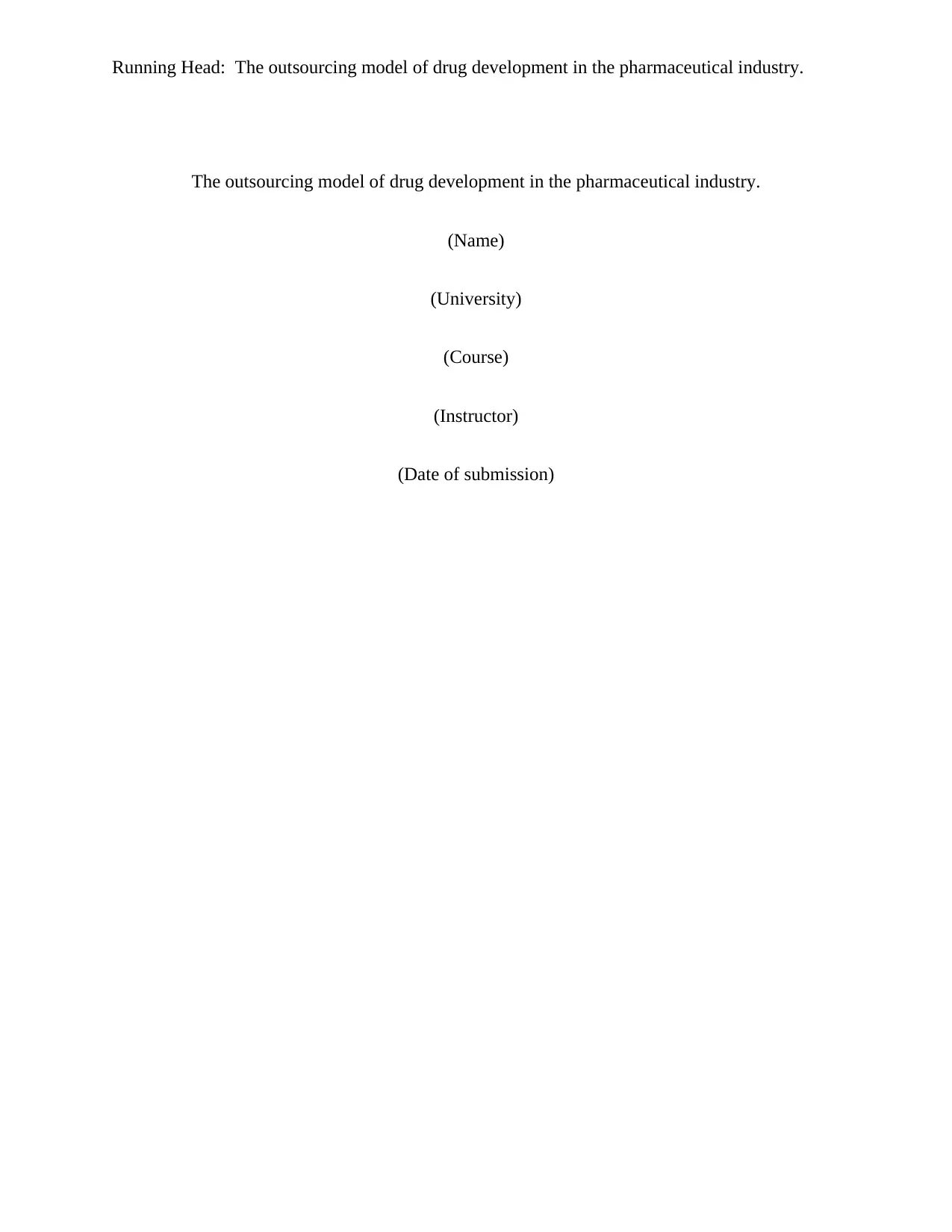
Running Head: The outsourcing model of drug development in the pharmaceutical industry.
The outsourcing model of drug development in the pharmaceutical industry.
(Name)
(University)
(Course)
(Instructor)
(Date of submission)
The outsourcing model of drug development in the pharmaceutical industry.
(Name)
(University)
(Course)
(Instructor)
(Date of submission)
Paraphrase This Document
Need a fresh take? Get an instant paraphrase of this document with our AI Paraphraser
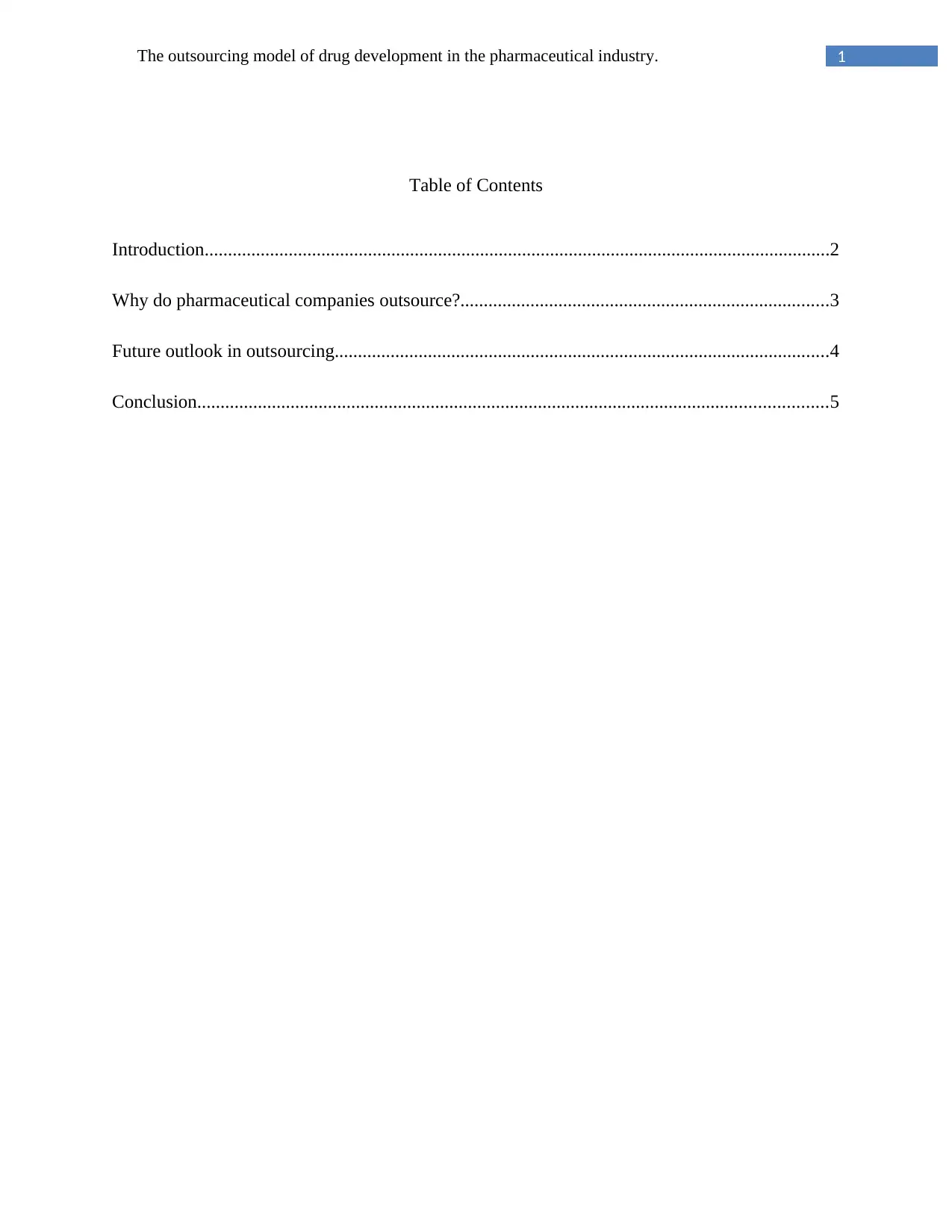
1The outsourcing model of drug development in the pharmaceutical industry.
Table of Contents
Introduction......................................................................................................................................2
Why do pharmaceutical companies outsource?...............................................................................3
Future outlook in outsourcing..........................................................................................................4
Conclusion.......................................................................................................................................5
Table of Contents
Introduction......................................................................................................................................2
Why do pharmaceutical companies outsource?...............................................................................3
Future outlook in outsourcing..........................................................................................................4
Conclusion.......................................................................................................................................5
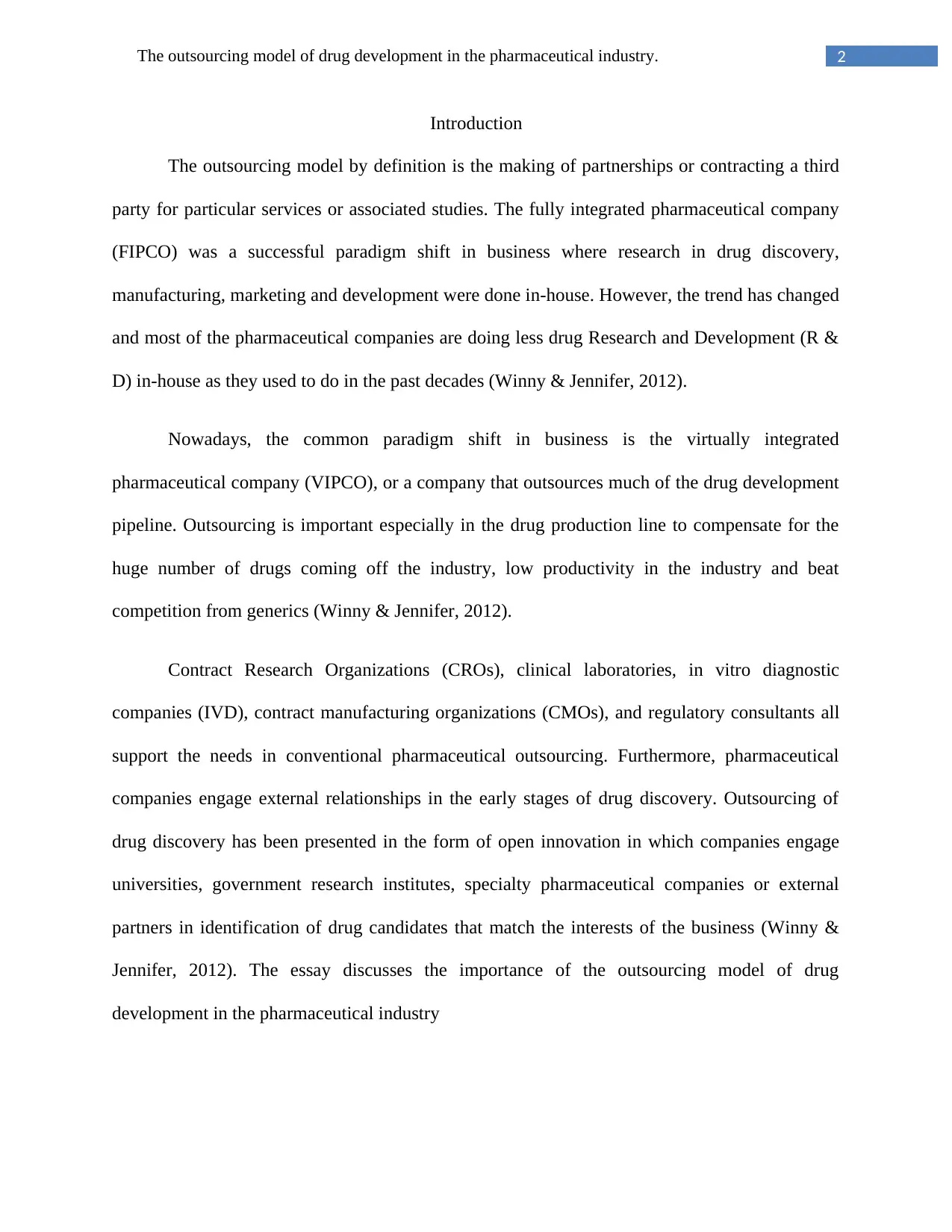
2The outsourcing model of drug development in the pharmaceutical industry.
Introduction
The outsourcing model by definition is the making of partnerships or contracting a third
party for particular services or associated studies. The fully integrated pharmaceutical company
(FIPCO) was a successful paradigm shift in business where research in drug discovery,
manufacturing, marketing and development were done in-house. However, the trend has changed
and most of the pharmaceutical companies are doing less drug Research and Development (R &
D) in-house as they used to do in the past decades (Winny & Jennifer, 2012).
Nowadays, the common paradigm shift in business is the virtually integrated
pharmaceutical company (VIPCO), or a company that outsources much of the drug development
pipeline. Outsourcing is important especially in the drug production line to compensate for the
huge number of drugs coming off the industry, low productivity in the industry and beat
competition from generics (Winny & Jennifer, 2012).
Contract Research Organizations (CROs), clinical laboratories, in vitro diagnostic
companies (IVD), contract manufacturing organizations (CMOs), and regulatory consultants all
support the needs in conventional pharmaceutical outsourcing. Furthermore, pharmaceutical
companies engage external relationships in the early stages of drug discovery. Outsourcing of
drug discovery has been presented in the form of open innovation in which companies engage
universities, government research institutes, specialty pharmaceutical companies or external
partners in identification of drug candidates that match the interests of the business (Winny &
Jennifer, 2012). The essay discusses the importance of the outsourcing model of drug
development in the pharmaceutical industry
Introduction
The outsourcing model by definition is the making of partnerships or contracting a third
party for particular services or associated studies. The fully integrated pharmaceutical company
(FIPCO) was a successful paradigm shift in business where research in drug discovery,
manufacturing, marketing and development were done in-house. However, the trend has changed
and most of the pharmaceutical companies are doing less drug Research and Development (R &
D) in-house as they used to do in the past decades (Winny & Jennifer, 2012).
Nowadays, the common paradigm shift in business is the virtually integrated
pharmaceutical company (VIPCO), or a company that outsources much of the drug development
pipeline. Outsourcing is important especially in the drug production line to compensate for the
huge number of drugs coming off the industry, low productivity in the industry and beat
competition from generics (Winny & Jennifer, 2012).
Contract Research Organizations (CROs), clinical laboratories, in vitro diagnostic
companies (IVD), contract manufacturing organizations (CMOs), and regulatory consultants all
support the needs in conventional pharmaceutical outsourcing. Furthermore, pharmaceutical
companies engage external relationships in the early stages of drug discovery. Outsourcing of
drug discovery has been presented in the form of open innovation in which companies engage
universities, government research institutes, specialty pharmaceutical companies or external
partners in identification of drug candidates that match the interests of the business (Winny &
Jennifer, 2012). The essay discusses the importance of the outsourcing model of drug
development in the pharmaceutical industry
⊘ This is a preview!⊘
Do you want full access?
Subscribe today to unlock all pages.

Trusted by 1+ million students worldwide
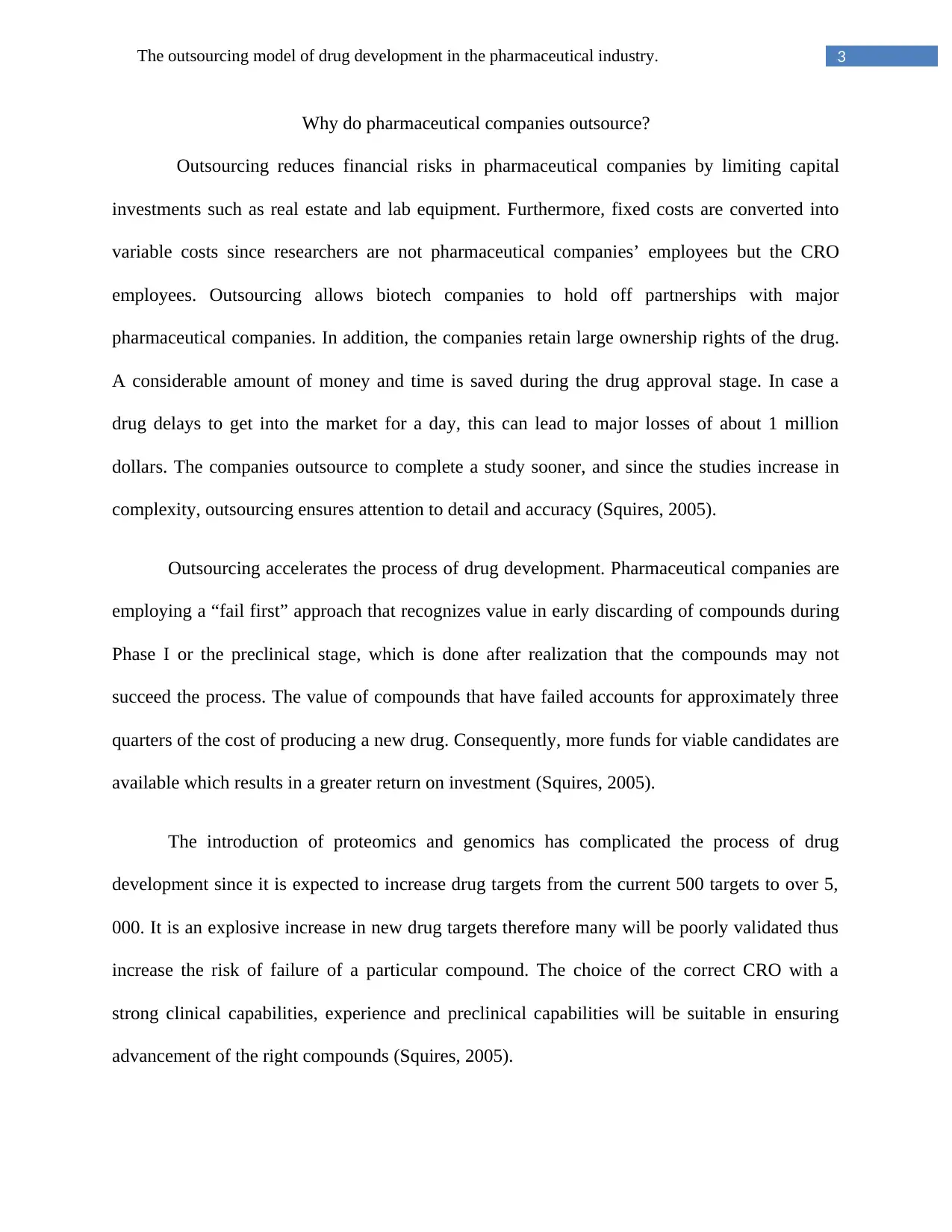
3The outsourcing model of drug development in the pharmaceutical industry.
Why do pharmaceutical companies outsource?
Outsourcing reduces financial risks in pharmaceutical companies by limiting capital
investments such as real estate and lab equipment. Furthermore, fixed costs are converted into
variable costs since researchers are not pharmaceutical companies’ employees but the CRO
employees. Outsourcing allows biotech companies to hold off partnerships with major
pharmaceutical companies. In addition, the companies retain large ownership rights of the drug.
A considerable amount of money and time is saved during the drug approval stage. In case a
drug delays to get into the market for a day, this can lead to major losses of about 1 million
dollars. The companies outsource to complete a study sooner, and since the studies increase in
complexity, outsourcing ensures attention to detail and accuracy (Squires, 2005).
Outsourcing accelerates the process of drug development. Pharmaceutical companies are
employing a “fail first” approach that recognizes value in early discarding of compounds during
Phase I or the preclinical stage, which is done after realization that the compounds may not
succeed the process. The value of compounds that have failed accounts for approximately three
quarters of the cost of producing a new drug. Consequently, more funds for viable candidates are
available which results in a greater return on investment (Squires, 2005).
The introduction of proteomics and genomics has complicated the process of drug
development since it is expected to increase drug targets from the current 500 targets to over 5,
000. It is an explosive increase in new drug targets therefore many will be poorly validated thus
increase the risk of failure of a particular compound. The choice of the correct CRO with a
strong clinical capabilities, experience and preclinical capabilities will be suitable in ensuring
advancement of the right compounds (Squires, 2005).
Why do pharmaceutical companies outsource?
Outsourcing reduces financial risks in pharmaceutical companies by limiting capital
investments such as real estate and lab equipment. Furthermore, fixed costs are converted into
variable costs since researchers are not pharmaceutical companies’ employees but the CRO
employees. Outsourcing allows biotech companies to hold off partnerships with major
pharmaceutical companies. In addition, the companies retain large ownership rights of the drug.
A considerable amount of money and time is saved during the drug approval stage. In case a
drug delays to get into the market for a day, this can lead to major losses of about 1 million
dollars. The companies outsource to complete a study sooner, and since the studies increase in
complexity, outsourcing ensures attention to detail and accuracy (Squires, 2005).
Outsourcing accelerates the process of drug development. Pharmaceutical companies are
employing a “fail first” approach that recognizes value in early discarding of compounds during
Phase I or the preclinical stage, which is done after realization that the compounds may not
succeed the process. The value of compounds that have failed accounts for approximately three
quarters of the cost of producing a new drug. Consequently, more funds for viable candidates are
available which results in a greater return on investment (Squires, 2005).
The introduction of proteomics and genomics has complicated the process of drug
development since it is expected to increase drug targets from the current 500 targets to over 5,
000. It is an explosive increase in new drug targets therefore many will be poorly validated thus
increase the risk of failure of a particular compound. The choice of the correct CRO with a
strong clinical capabilities, experience and preclinical capabilities will be suitable in ensuring
advancement of the right compounds (Squires, 2005).
Paraphrase This Document
Need a fresh take? Get an instant paraphrase of this document with our AI Paraphraser
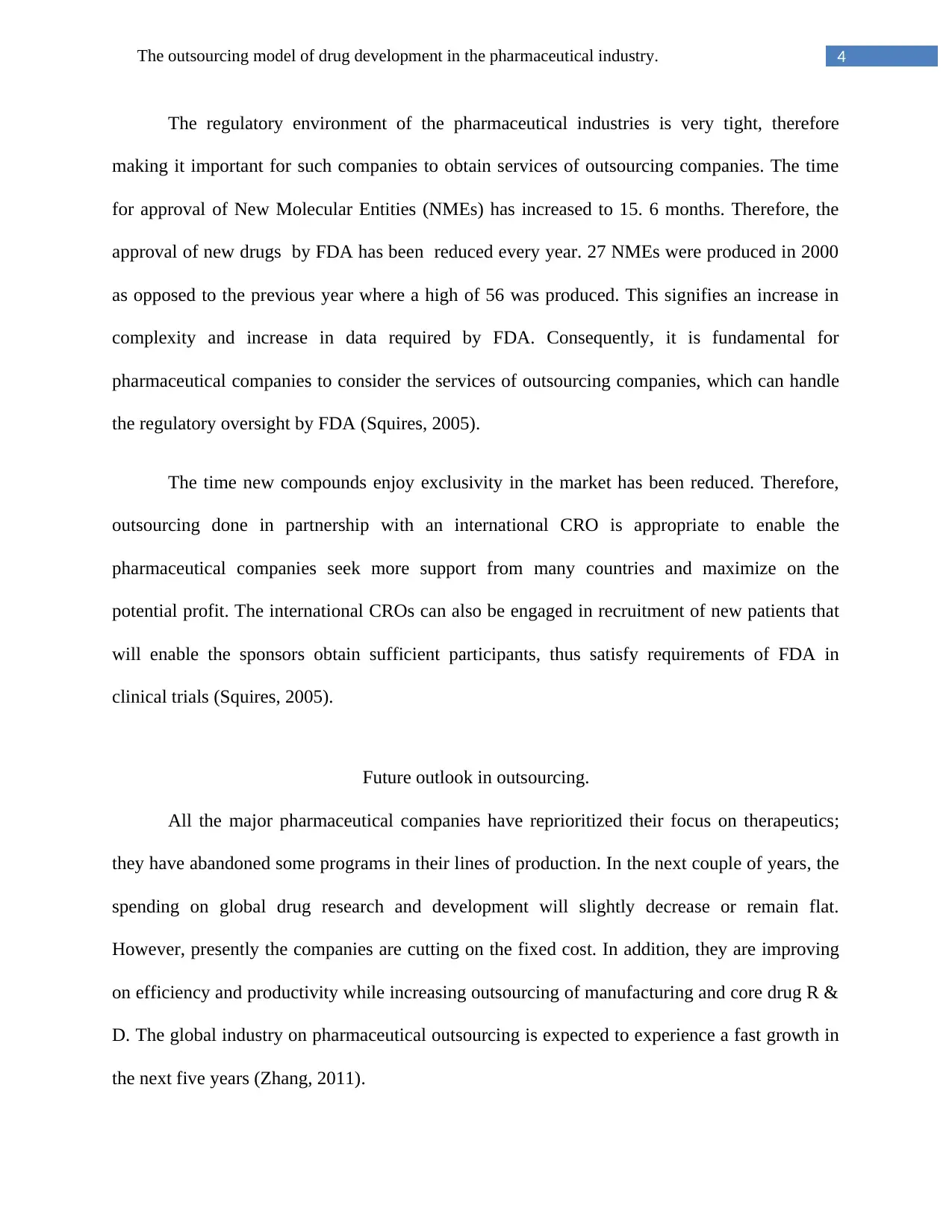
4The outsourcing model of drug development in the pharmaceutical industry.
The regulatory environment of the pharmaceutical industries is very tight, therefore
making it important for such companies to obtain services of outsourcing companies. The time
for approval of New Molecular Entities (NMEs) has increased to 15. 6 months. Therefore, the
approval of new drugs by FDA has been reduced every year. 27 NMEs were produced in 2000
as opposed to the previous year where a high of 56 was produced. This signifies an increase in
complexity and increase in data required by FDA. Consequently, it is fundamental for
pharmaceutical companies to consider the services of outsourcing companies, which can handle
the regulatory oversight by FDA (Squires, 2005).
The time new compounds enjoy exclusivity in the market has been reduced. Therefore,
outsourcing done in partnership with an international CRO is appropriate to enable the
pharmaceutical companies seek more support from many countries and maximize on the
potential profit. The international CROs can also be engaged in recruitment of new patients that
will enable the sponsors obtain sufficient participants, thus satisfy requirements of FDA in
clinical trials (Squires, 2005).
Future outlook in outsourcing.
All the major pharmaceutical companies have reprioritized their focus on therapeutics;
they have abandoned some programs in their lines of production. In the next couple of years, the
spending on global drug research and development will slightly decrease or remain flat.
However, presently the companies are cutting on the fixed cost. In addition, they are improving
on efficiency and productivity while increasing outsourcing of manufacturing and core drug R &
D. The global industry on pharmaceutical outsourcing is expected to experience a fast growth in
the next five years (Zhang, 2011).
The regulatory environment of the pharmaceutical industries is very tight, therefore
making it important for such companies to obtain services of outsourcing companies. The time
for approval of New Molecular Entities (NMEs) has increased to 15. 6 months. Therefore, the
approval of new drugs by FDA has been reduced every year. 27 NMEs were produced in 2000
as opposed to the previous year where a high of 56 was produced. This signifies an increase in
complexity and increase in data required by FDA. Consequently, it is fundamental for
pharmaceutical companies to consider the services of outsourcing companies, which can handle
the regulatory oversight by FDA (Squires, 2005).
The time new compounds enjoy exclusivity in the market has been reduced. Therefore,
outsourcing done in partnership with an international CRO is appropriate to enable the
pharmaceutical companies seek more support from many countries and maximize on the
potential profit. The international CROs can also be engaged in recruitment of new patients that
will enable the sponsors obtain sufficient participants, thus satisfy requirements of FDA in
clinical trials (Squires, 2005).
Future outlook in outsourcing.
All the major pharmaceutical companies have reprioritized their focus on therapeutics;
they have abandoned some programs in their lines of production. In the next couple of years, the
spending on global drug research and development will slightly decrease or remain flat.
However, presently the companies are cutting on the fixed cost. In addition, they are improving
on efficiency and productivity while increasing outsourcing of manufacturing and core drug R &
D. The global industry on pharmaceutical outsourcing is expected to experience a fast growth in
the next five years (Zhang, 2011).
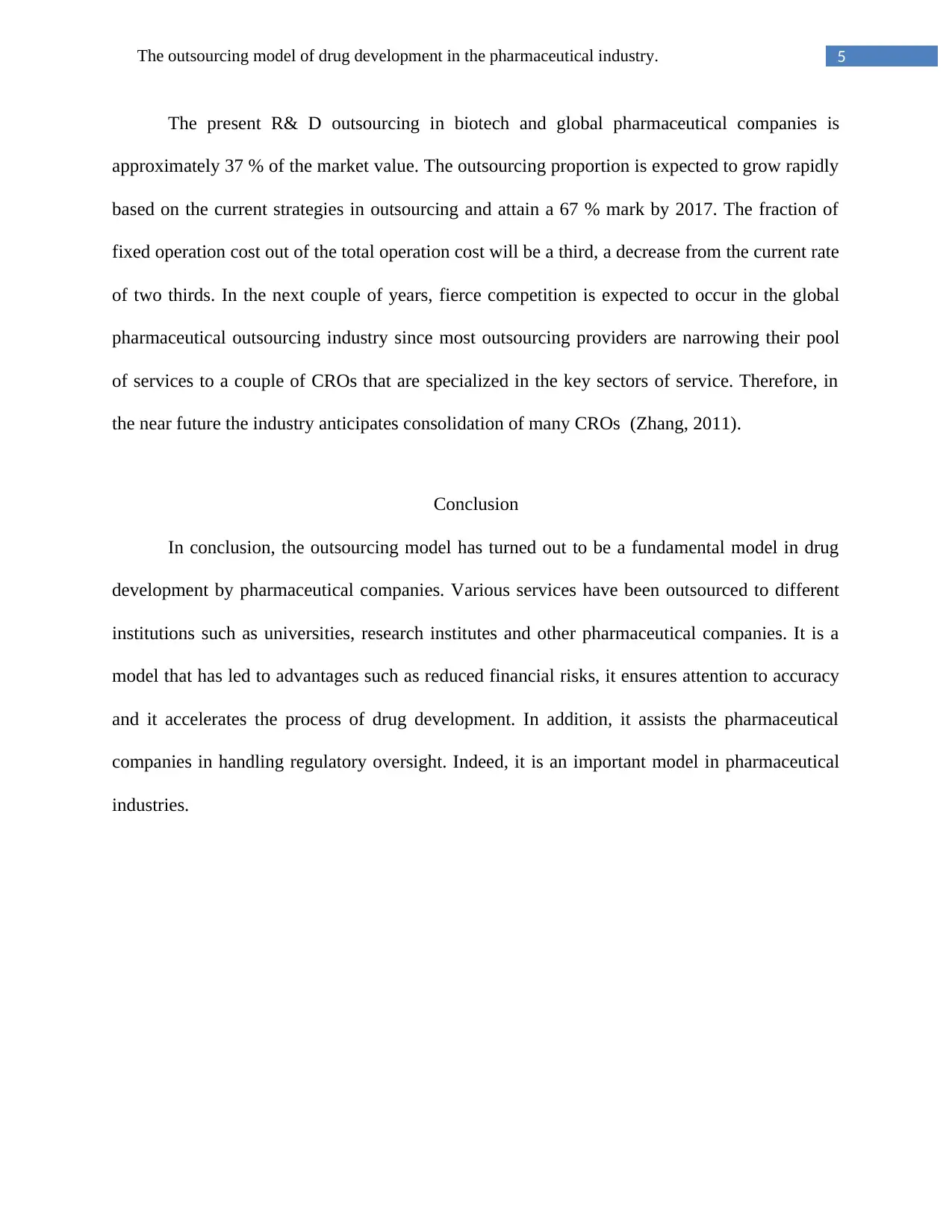
5The outsourcing model of drug development in the pharmaceutical industry.
The present R& D outsourcing in biotech and global pharmaceutical companies is
approximately 37 % of the market value. The outsourcing proportion is expected to grow rapidly
based on the current strategies in outsourcing and attain a 67 % mark by 2017. The fraction of
fixed operation cost out of the total operation cost will be a third, a decrease from the current rate
of two thirds. In the next couple of years, fierce competition is expected to occur in the global
pharmaceutical outsourcing industry since most outsourcing providers are narrowing their pool
of services to a couple of CROs that are specialized in the key sectors of service. Therefore, in
the near future the industry anticipates consolidation of many CROs (Zhang, 2011).
Conclusion
In conclusion, the outsourcing model has turned out to be a fundamental model in drug
development by pharmaceutical companies. Various services have been outsourced to different
institutions such as universities, research institutes and other pharmaceutical companies. It is a
model that has led to advantages such as reduced financial risks, it ensures attention to accuracy
and it accelerates the process of drug development. In addition, it assists the pharmaceutical
companies in handling regulatory oversight. Indeed, it is an important model in pharmaceutical
industries.
The present R& D outsourcing in biotech and global pharmaceutical companies is
approximately 37 % of the market value. The outsourcing proportion is expected to grow rapidly
based on the current strategies in outsourcing and attain a 67 % mark by 2017. The fraction of
fixed operation cost out of the total operation cost will be a third, a decrease from the current rate
of two thirds. In the next couple of years, fierce competition is expected to occur in the global
pharmaceutical outsourcing industry since most outsourcing providers are narrowing their pool
of services to a couple of CROs that are specialized in the key sectors of service. Therefore, in
the near future the industry anticipates consolidation of many CROs (Zhang, 2011).
Conclusion
In conclusion, the outsourcing model has turned out to be a fundamental model in drug
development by pharmaceutical companies. Various services have been outsourced to different
institutions such as universities, research institutes and other pharmaceutical companies. It is a
model that has led to advantages such as reduced financial risks, it ensures attention to accuracy
and it accelerates the process of drug development. In addition, it assists the pharmaceutical
companies in handling regulatory oversight. Indeed, it is an important model in pharmaceutical
industries.
⊘ This is a preview!⊘
Do you want full access?
Subscribe today to unlock all pages.

Trusted by 1+ million students worldwide
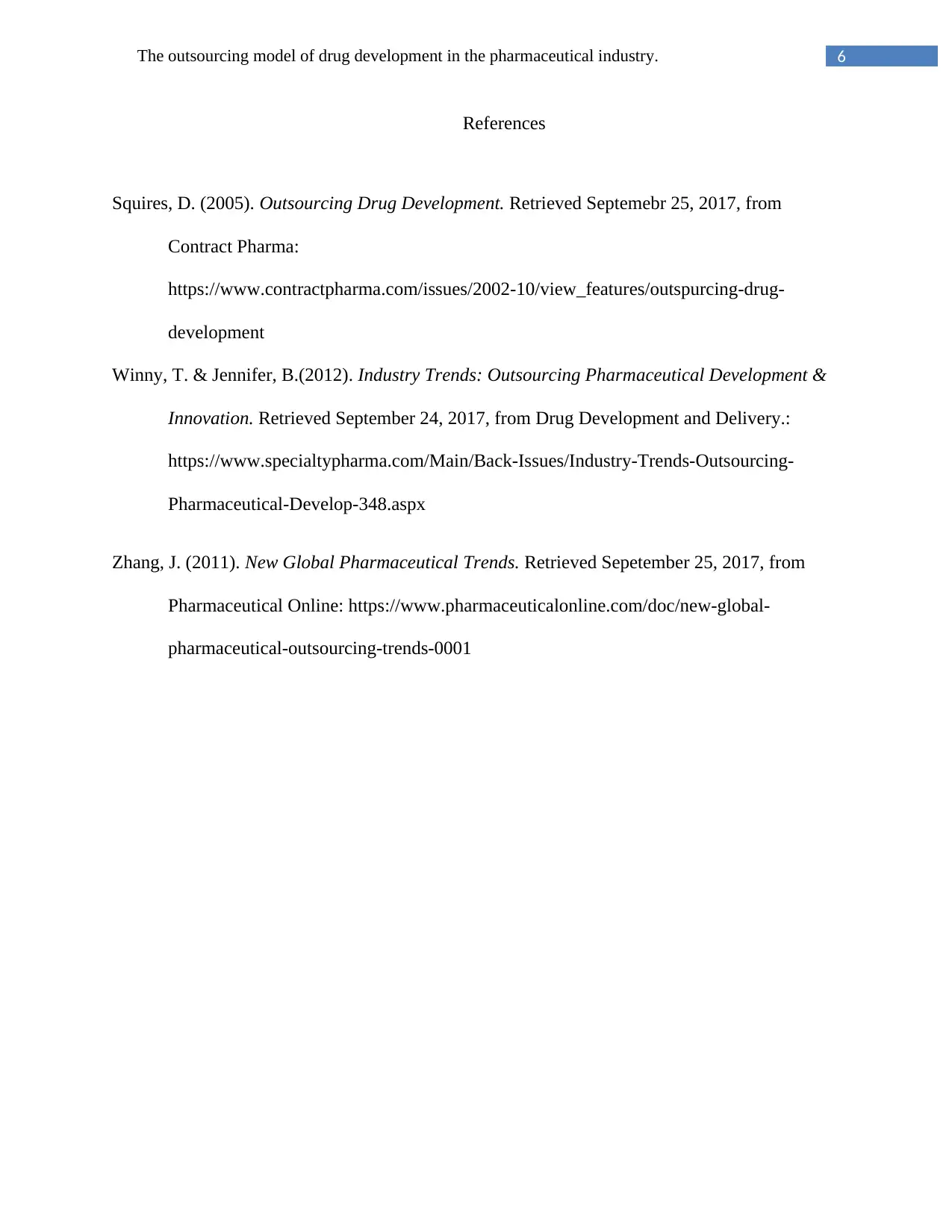
6The outsourcing model of drug development in the pharmaceutical industry.
References
Squires, D. (2005). Outsourcing Drug Development. Retrieved Septemebr 25, 2017, from
Contract Pharma:
https://www.contractpharma.com/issues/2002-10/view_features/outspurcing-drug-
development
Winny, T. & Jennifer, B.(2012). Industry Trends: Outsourcing Pharmaceutical Development &
Innovation. Retrieved September 24, 2017, from Drug Development and Delivery.:
https://www.specialtypharma.com/Main/Back-Issues/Industry-Trends-Outsourcing-
Pharmaceutical-Develop-348.aspx
Zhang, J. (2011). New Global Pharmaceutical Trends. Retrieved Sepetember 25, 2017, from
Pharmaceutical Online: https://www.pharmaceuticalonline.com/doc/new-global-
pharmaceutical-outsourcing-trends-0001
References
Squires, D. (2005). Outsourcing Drug Development. Retrieved Septemebr 25, 2017, from
Contract Pharma:
https://www.contractpharma.com/issues/2002-10/view_features/outspurcing-drug-
development
Winny, T. & Jennifer, B.(2012). Industry Trends: Outsourcing Pharmaceutical Development &
Innovation. Retrieved September 24, 2017, from Drug Development and Delivery.:
https://www.specialtypharma.com/Main/Back-Issues/Industry-Trends-Outsourcing-
Pharmaceutical-Develop-348.aspx
Zhang, J. (2011). New Global Pharmaceutical Trends. Retrieved Sepetember 25, 2017, from
Pharmaceutical Online: https://www.pharmaceuticalonline.com/doc/new-global-
pharmaceutical-outsourcing-trends-0001
1 out of 7
Your All-in-One AI-Powered Toolkit for Academic Success.
+13062052269
info@desklib.com
Available 24*7 on WhatsApp / Email
![[object Object]](/_next/static/media/star-bottom.7253800d.svg)
Unlock your academic potential
Copyright © 2020–2025 A2Z Services. All Rights Reserved. Developed and managed by ZUCOL.

